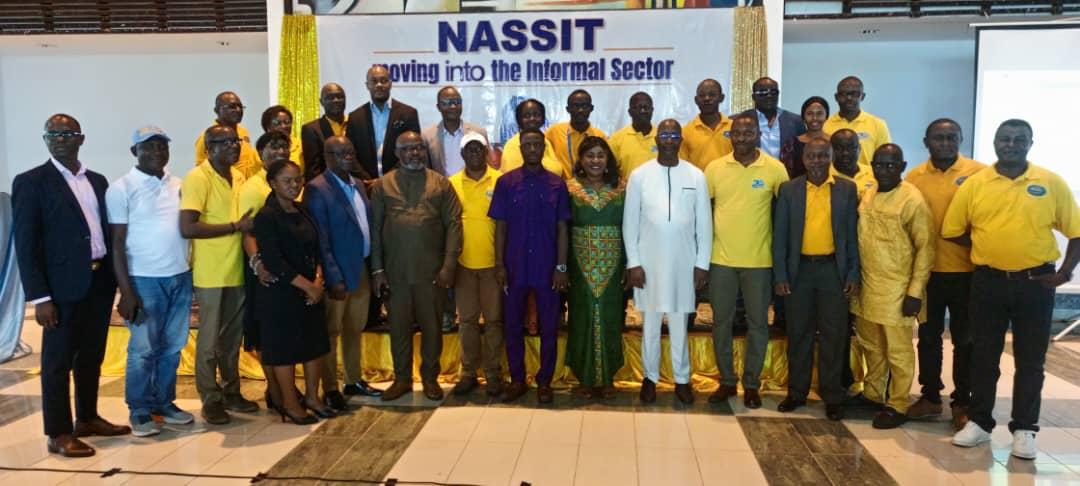In its desire to extend coverage to the informal sector and provide social protection to the majority of Sierra Leoneans, the National Social Security and Insurance Trust (NASSIT) on Thursday 14th September hosted the inaugural meeting of the Informal Sector Steering Committee at the Freetown International Conference Centre, Aberdeen in Freetown.
Delivering the keynote address, Honourable Mohamed Rahman Swarray, Minister of Employment, Labour and Social Security, who is also the Chairman of the Informal Sector Steering Committee, said that over the years, despite efforts to attract members of the informal sector economy to the NASSIT scheme, only a very small number had registered.
“I, therefore, want to thank the Director General, Mohamed Fuaad Daboh, and his team for the hard work in ensuring that an Informal Sector Scheme is established,” the Minister said, adding that President Julius Maada Bio was fully committed to the dream of having the Scheme actualized.
“This is evident by the host of Ministers in attendance at this meeting, which also shows its importance,” Minister Swarray re-affirmed while disclosing that he inherited a reviewed draft legislation and Cabinet paper for the establishment of the Informal Sector Scheme which he would table to the Technical and Steering Committees in due course.
While recognising the presence of delegates the International Labour Organisation (ILO), Honourable Mohamed Rahman Swarray called on them to share their expertise with NASSIT, as they had been in the business for quite a long time with a vast experience in the operations of the informal sector economy.
Standing in for the Director General, the Deputy Director General, Mohamed Gondoe, emphasised the importance of social security, describing it as the “protection that society provides to individuals and households to ensure access to health care and to secure income security, particularly in cases of old age, unemployment, sickness, invalidity, work injury, maternity or loss of a breadwinner”. Mr Gondoe explained that NASSIT had not been able to attract members beyond those who were mandated to join the scheme as prescribed by the Act. “The benefits provided by the current NASSIT Scheme are long-term in nature, thus making it very unattractive to the informal sector economy.” Mr. Gondoe explained.
The Deputy Director General noted, however, that it was under the current administration of Mr. Mohamed Fuaad Daboh that the idea of designing and implementing an appropriate social protection scheme that would meet the needs of the informal sector workers was borne, adding, “NASSIT, in collaboration with the ILO, developed a concept paper with a clear road map and timelines. Key players were later brought together from other Institutions/Ministries who form the Technical Committee, and Management is very happy about their contributions”.
Dr Vanessa Phala, the Director of the ILO Country Office for Nigeria, Ghana, Liberia, and Sierra Leone and Liaison Office for ECOWAS, said leaders had shown very strong political will at the highest level to put in place policies aimed at promoting social protection and ensuring effective access to social security to all. She, however, noted that despite this, Africa remains the region with the lowest social protection coverage in the world, further explaining that the situation was much more worrying in West Africa where only 13% per cent of the population was covered by at least one social protection benefit. The ILO Country Office Director said such challenge was a result of the inadequacy of existing mechanisms to cover workers in the informal economy and the underfunding of the social protection system, exclusion from legal coverage, limited contributory capacities and inflexible financial arrangements, complex and burdensome administrative procedures, weak enforcement or incentives to participate in voluntary schemes and lack of information, awareness and trust.
“Extending social security protection to the informal economy workers requires a new way of programming and innovative financing mechanisms”, she explained. Proffering a way forward, Madam Vanessa said the extension of coverage to workers in the informal sector should be part of a comprehensive and integrated national social protection strategy, which should be led by the Government and built around fundamental principles, including the universality of protection, the inadequacy and predictability of benefits, financial sustainability, non-discrimination, sound administration and tripartite participation.
The Deputy Director General in charge of Operations, NASSIT, Mr. Edwin Kamara, coordinated the panel discussion, and the online presentation climaxed the occasion.
 The meeting attracted foreign delegates from the International Social Security Association (ISSA), the International Labor Organization (ILO), sister social security institutions across sub-Sahara Africa, Government Ministers, and members of the Technical committee.
The meeting attracted foreign delegates from the International Social Security Association (ISSA), the International Labor Organization (ILO), sister social security institutions across sub-Sahara Africa, Government Ministers, and members of the Technical committee.
NASSIT, we care!













